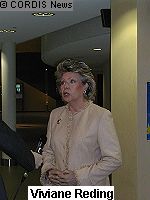EU needs sense of urgency in ICT policies, says Reding
Information and communications technologies [ICT] are essential as a dynamo of change and modernisation, and Europe needs to inject a sense of urgency and opportunity into its discourse and its actions if it serious about growth and jobs, says EU Commissioner for Information Society and Media, Viviane Reding. Speaking on 22 February on how to make Europe's information society competitive, Ms Reding regretted that fact that Europe is spending 20 per cent of its research budget on ICT, compared to 30 per cent in other major economies. She called for urgent and coordinated action between all stakeholders to reverse this trend. 'I ask myself the question, are we serious in Europe about growth and jobs when we systematically under invest in the development of the sector that everyone agrees is the one that has the potential to deliver the most to our economic success?' Ms Reding asked. 'In particular, I wonder if we are not prioritising research into the economy of the past two decades rather than that of the next twenty years; the old economy rather than the new economy!' she added. According to the Commissioner, the next few years will be crucial in terms of worldwide digital services take off. She warned that if digital services are delayed in Europe, they will be developed and tested elsewhere. 'We will lose the opportunity to define these services in a way which meets our standards. We will not capture the new growth and jobs that will come from their development,' Ms Reding said. Furthermore, added Ms Reding, a new concept of 'digital literacy' will need to be developed. The an-alphabetisation of tomorrow will no longer depend on the inability of using a computer as such but on whether individuals possess the social aptitudes to live and work in a knowledge society. This, believes Ms Reding, means the ability to respond to the two defining characteristics of a knowledge society: continuous change and the conversion of information into knowledge. In both cases, ICT will provide the basic tools for knowledge management and open learning, stated the Commissioner. Aware that despite research leadership in some areas, Europe is vulnerable to increased international competition, Ms Reding intends to come forward with an action plan. 'We are already sliding into catch-up mode on establishing a clear and predictable approach to emerging applications such as Voice over Internet, Radio Spectrum Policies and smart radio tags. This uncertainty deters investors and holds back innovation,' deplored Ms Reding. Furthermore, she added, 'the general frameworks for the digital services economy (the content and services that make broadband one of the motors of the new economy) also remain unclear and fragmented. We need to adopt a 'joined-up' approach to these emerging markets that makes it easy to navigate the patchwork of rules on intellectual property rights, systems for security and trust, electronic payments, liabilities for e-commerce businesses and so on.' 'I intend to review this field and to come forward with an action plan. In line with the philosophy of better regulation, I am not seeking to define more regulation. In fact, if we can we might consider eliminating regulation. I am thinking in terms of guidelines and best practices,' Ms Reding explained. Turning to the subject of the Seventh Framework Programme (FP7), Ms Reding regretted the fact that at present her Directorate General has to turn down half of the top rated applications it receives, simply due to a lack of available funds. She stated that she would be looking for a doubling of the Information Society Technologies budget in FP7. 'I am also looking for a more streamlined and efficient research programme. I will seek changes in the Community research programme, to cut red tape and encourage more SME [small and medium sized enterprise] and corporate involvement,' Ms Reding added. 'Research needs to be more targeted, more strategic and more attractive to industry. Concluding, Ms Reding called on Member States and the private sector to support the European Commission's i2010 initiative of providing a borderless European information space by increasing investment and insuring interoperability and security standards.



